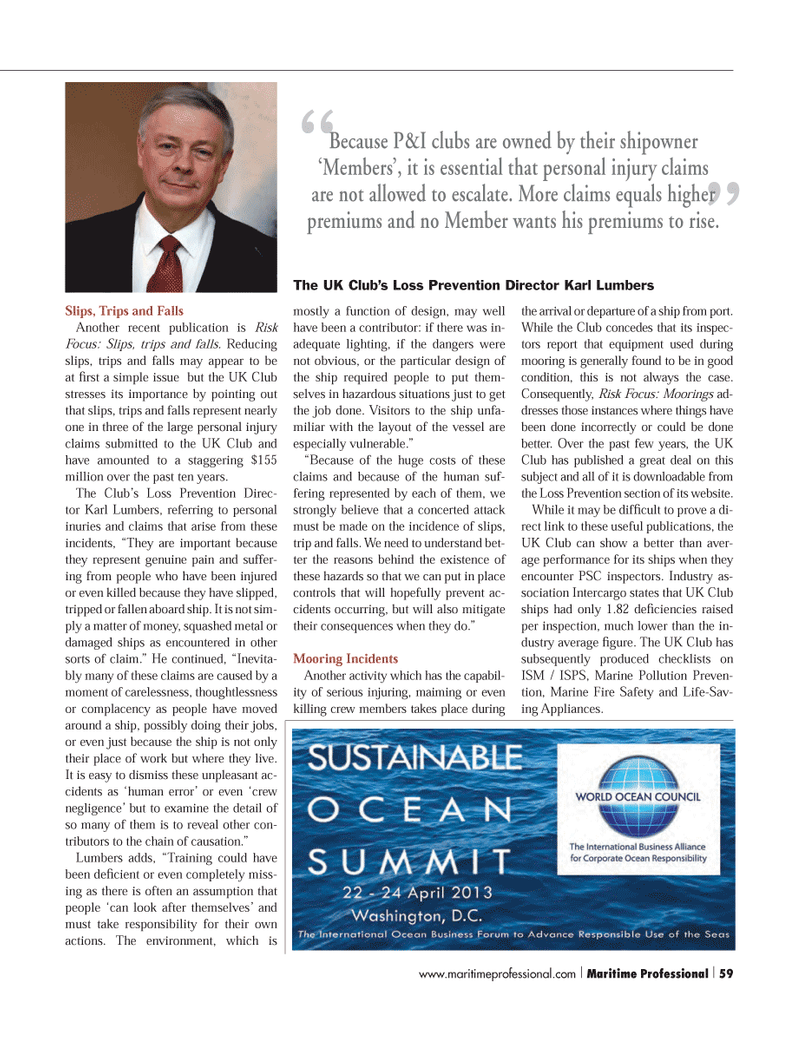
Page 59: of Maritime Logistics Professional Magazine (Q1 2013)
Maritime Risk
Read this page in Pdf, Flash or Html5 edition of Q1 2013 Maritime Logistics Professional Magazine
Slips, Trips and Falls Another recent publication is Risk Focus: Slips, trips and falls. Reducing slips, trips and falls may appear to be at Þ rst a simple issue but the UK Club stresses its importance by pointing out that slips, trips and falls represent nearly one in three of the large personal injury claims submitted to the UK Club and have amounted to a staggering $155 million over the past ten years. The ClubÕs Loss Prevention Direc- tor Karl Lumbers, referring to personal inuries and claims that arise from these incidents, ÒThey are important because they represent genuine pain and suffer- ing from people who have been injured or even killed because they have slipped, tripped or fallen aboard ship. It is not sim- ply a matter of money, squashed metal or damaged ships as encountered in other sorts of claim.Ó He continued, ÒInevita- bly many of these claims are caused by a moment of carelessness, thoughtlessness or complacency as people have moved around a ship, possibly doing their jobs, or even just because the ship is not only their place of work but where they live. It is easy to dismiss these unpleasant ac-cidents as Ôhuman errorÕ or even Ôcrew negligenceÕ but to examine the detail of so many of them is to reveal other con- tributors to the chain of causation.Ó Lumbers adds, ÒTraining could have been deÞ cient or even completely miss- ing as there is often an assumption that people Ôcan look after themselvesÕ and must take responsibility for their own actions. The environment, which is mostly a function of design, may well have been a contributor: if there was in- adequate lighting, if the dangers were not obvious, or the particular design of the ship required people to put them-selves in hazardous situations just to get the job done. Visitors to the ship unfa- miliar with the layout of the vessel are especially vulnerable.Ó ÒBecause of the huge costs of these claims and because of the human suf-fering represented by each of them, we strongly believe that a concerted attack must be made on the incidence of slips, trip and falls. We need to understand bet- ter the reasons behind the existence of these hazards so that we can put in place controls that will hopefully prevent ac- cidents occurring, but will also mitigate their consequences when they do.Ó Mooring IncidentsAnother activity which has the capabil- ity of serious injuring, maiming or even killing crew members takes place during the arrival or departure of a ship from port. While the Club concedes that its inspec-tors report that equipment used during mooring is generally found to be in good condition, this is not always the case. Consequently, Risk Focus: Moorings ad-dresses those instances where things have been done incorrectly or could be done better. Over the past few years, the UK Club has published a great deal on this subject and all of it is downloadable from the Loss Prevention section of its website. While it may be difÞ cult to prove a di- rect link to these useful publications, the UK Club can show a better than aver- age performance for its ships when they encounter PSC inspectors. Industry as-sociation Intercargo states that UK Club ships had only 1.82 deÞ ciencies raised per inspection, much lower than the in- dustry average Þ gure. The UK Club has subsequently produced checklists on ISM / ISPS, Marine Pollution Preven- tion, Marine Fire Safety and Life-Sav- ing Appliances.??Because P&I clubs are owned by their shipowner ?Members?, it is essential that personal injury claims are not allowed to escalate. More claims equals higher premiums and no Member wants his premiums to rise. The UK Club?s Loss Prevention Director Karl Lumbers www.maritimeprofessional.com | Maritime Professional | 59MP #4 50-63.indd 59MP #4 50-63.indd 592/25/2013 9:55:37 AM2/25/2013 9:55:37 AM

 58
58

 60
60
